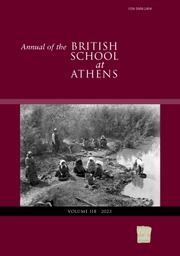Article contents
Extract
These notes are for the most part devoted to questions of phonetics, dealing more with Lautlehre than with Formenlehre, and do not pretend to give a complete account of the dialect. I have thought this side of the subject most worth developing, because it is that which native collectors, excellent from the sides of lexicography and literature, are apt to neglect.
The dialect of Karpathos belongs to the south-eastern or south-Sporadic group of modern Greek dialects, which extends over Cyprus, Rhodes, Kos, Kalymnos, and other islands as far north as Chios. Its connexion with Cretan has also been recognized.
- Type
- Research Article
- Information
- Copyright
- Copyright © The Council, British School at Athens 1904
References
page 83 note 1 The following abbreviations are used: E. = Elymbos, Mes. = Mesochória, Men. = Menités, P. = Palaíkastro, V. = Voládha, K. = Karpathos.
page 83 note 2 Quoted as Καρπ and Z. A.
page 83 note 3 My copy of Manolakákis', Δωρικὸν ψήφισμα Καρπάθου Athens, 1878Google Scholar, containing also songs I have unfortunately lost. The other scattered pieces that have been published are unimportant.
page 85 note 1 Some words, traditionally written with an accent, are really proclitic. This is especially true of the article, which, accented and unaccented forms alike, bears at most a secondary stress. Its proclitic nature appears also in the fact that in Northern Greek its vowel shares the weakening of unaccented vowels in general. E.g. from Velvendos we have for ὁ, τὸν, τοῦ, τῆς respectively οὑ τοὺν, τ, τς. From lack of certainty as to its proper stress I have however accented it as usual, merely avoiding the meaningless circumflex.
page 86 note 1 The rule, with a number of other places where it is not observed, is given by Thumb, Hdb. der Neugr. Volkssprache, § II. ‘Alle Wörter, bei denen ein ursprünglich betontes i oder e dem die Schlusssilbe bildenden Vocale vorausgeht, erhalten Endbetonung.’
page 87 note 1 Which even inserts ž between words to fill hiatus; e.g. οἱ Ζ῀ ἄΖ῀οι, οἱΖ῀ ἄλλοι for οἱ ἄγιοι, οἱ ἄλλοι. Note also žη for ἤ
page 91 note 1 Connected with this form dos is the gen. pl. of ἄνδρας, τὼν ἀδρός which is heard not only at Palaíkastro but elsewhere in Crete, Ζ῀υναικός also occurs, but is unusual.
page 91 note 2 Although the peculiar pronunciation of πι̯- noticed above is only to be explained by supposing that the normal rule acts here in external as well as in internal combination.
page 100 note 1 Except in the half-extemporary couplets, with which the village dance is enlivened. In these the ending συ(ν occasionally occurs.
- 2
- Cited by




